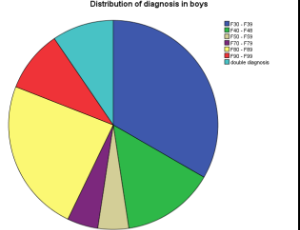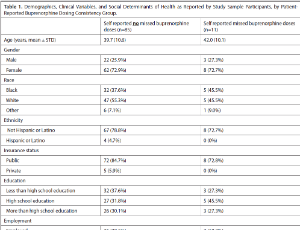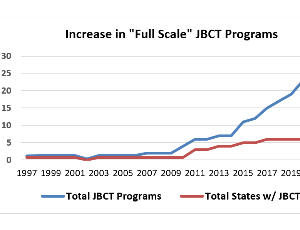Loading
The Archives of Psychiatry
ISSN: 2995-8776


Doug Smith
Professor
Northeast Ohio Medical University, USA
Featured Article
Clinical Characteristics of Outpatient Adolescents Undergoing Ongoing Psychotherapy in a Greek Tertiary Hospital from June 2016 to December 2019

Featured Article
The Role of Patient-Reported Social Factors in Promoting Buprenorphine Consistency

Featured Article
The Future of Jail-Based Competency Treatment: Commentary from 30,000 Feet

About this Journal
The Archives of Psychiatry is an international, peer reviewed, open access, double blind, rapid publication journal from the house of scientific archives. The journal intents to publish a broad research area on the medical specialty-psychiatry. The journal encourages global researchers to communicate original research, reviews, case studies, commentaries, interviews and short communications.
Articles
Digital Conversations about Severe Depression Symptoms Across Different Ethnic and Racial Groups: A Big-data, Machine Learning Analysis
Depression is a common but serious mental disease that ranges widely in severity. It affects 5% of adults worldwide, and approximately 280 million people in the world suffer from the condition. The National Center for Health Statistics reported in 2019 that 2.8% of adults had symptoms of severe depression, 4.2% had moderate depression, and 11.5% had mild depression, in the two weeks recorded. One way to early detect symptoms of depression is to analyze what people are talking about - their conversations.
Listening In: A Model of Healing Rooted in Developmental Science
Practitioners working on the front lines with young children may feel pressure to advise, instruct, and intervene. Decades of research in contemporary developmental science point to an alternative approach termed “listening in.” This commentary will review evidence supporting this approach, showing its application in a common clinical scenario. It will root the approach in concepts of cultural difference and the importance of cultivating a sense of belonging.
The Challenge of Disentangling Parkinson’s-related Fatigue and Neuropsychiatric Symptoms
Fatigue is among the most prevalent and debilitating non-motor symptoms in Parkinson’s disease (PD). In the focal article, “Screening cut-off scores for clinically significant fatigue in early Parkinson’s disease”, we discussed the challenges of evaluating fatigue in PD and proposed cut-off scores for select fatigue assessments. This commentary expands on the challenges of evaluating fatigue, especially when it presents alongside psychiatric symptoms. We examine and compare the similarities of fatigue and depression, anxiety, and apathy.
Epigenetic Regulation in Alzheimer's Disease – Development, Challenges, and Future Perspectives
Alzheimer’s disease (AD) remains a formidable challenge in neuroscience, with its complex pathology still lacking an effective cure. Recent research has highlighted the critical role of epigenetic regulation in AD, demonstrating how environmental factors and genetic predispositions influence disease progression at a molecular level. This commentary examines key advancements in AD-related epigenetic research, with a particular focus on histone deacetylases (HDACs) and adrenergic signaling-two mechanisms that have emerged as promising therapeutic targets for mitigating AD symptoms and slowing neurodegeneration.
How to Treat Patients with Severe Intellectual Disabilities in Psychiatry?
Many adults with intellectual disabilities have serious behavioral problems, sometimes requiring medical intervention. To this end, it is essential to improve the medical care of this population because there is a very large disparity in the care offered to them compared to the general population. Challenging behaviors constitute a real challenge in supporting people with severe intellectual disabilities, which can cause great difficulty for individuals, institutions and psychiatric services.
Language Disorders in People with Profound Intellectual and Multiple Disabilities
People with profound intellectual and multiple disabilities present significant challenges to those who care for them, and those who commission and manage the services they receive. Childhood disabilities are a cause of major concern causing significant handicap to the affected children. At least one in ten children are born with or acquire a physical, mental or sensory impairment.
Diagnosis and Assessment of Non-Suicidal Self-Injury in the Background of Integrated Traditional Chinese Medicine and Western Medicine
Non-suicidal self-injury (NSSI) refers to deliberate and repeated acts of damaging one's own body tissue without suicidal intent. It is usually related to depression, bipolar disorder (BD), post-traumatic stress disorder (PTSD), and borderline personality disorder (BPD). Integrated Chinese and Western medicine treatment is one of the effective methods for the treatment of NSSTI at present.
The Relationship between Physical Activity Level and Short Video Addiction in Individuals with Bipolar Disorder
The aim of this study is to investigate the relationship between physical activity level and short video addiction in individuals diagnosed with bipolar disorder. This study was planned as a descriptive relational study. The sample of the study consisted of 100 individuals over the age of 18 with bipolar disorder who were followed up in a family health center in Selçuklu district of Konya province. The data of the study was collected by face-to-face interview method.
Therapeutic Alliance and Affordability: Indicators of Early Dropout in Telepsychiatry
Early dropout from psychiatric care remains a persistent barrier to effective treatment. To investigate the role of therapeutic alliance and financial burden in contemporary treatment settings, we conducted a retrospective analysis using data from a large national telepsychiatry platform. The study included 796 adults (≥18 years) who completed at least two visits and had working alliance inventory-short revised (WAI-SR) scores within 45 days of their initial appointment.
Borderline Personality Disorder: A Valid Psychiatric Diagnosis
The validity of borderline personality disorder (BPD) has become an urgent issue in psychiatric nosology, with some proposing its absorption into complex posttraumatic stress disorder and others questioning its utility due to stigma. With planning for DSM-6 underway, reassessing the validity of BPD is both timely and necessary.
Pain in People with Profound Intellectual and Multiple Disabilities
The inability to communicate verbally does not in any way negate the possibility that an individual may be experiencing pain and may need appropriate treatment to relieve their pain. Pain can be expressed differently from one person to another. It can be difficult to decode and interpret and, as a result, can be underestimated by caregivers, particularly in people with multiple disabilities, due to their sensory specificities and unique communication modalities.
Two Brief Communications on Autism: The Relationship Between Testosterone and Stem Savants and an Ethological View of Repetitive Behavior
This commentary addresses two distinct aspects of autism spectrum condition. First, it critiques the proposed link between fetal testosterone levels and the emergence of autistic traits, arguing that such theories are reductive and risk overshadowing the profound heterogeneity and individuality of autistic people. The author suggests a more limited, theoretical connection between testosterone-driven neural development and a higher incidence of STEM savant skills in some autistic individuals.
The Future of Jail-Based Competency Treatment: Commentary from 30,000 Feet
In their recent article, “Jail-Based Competency Treatment Comes of Age,” Jennings et al. reviewed the historical development of the model and presented the first large-scale empirical support for its effectiveness, which covered eight years of outcomes across four different program sites for nearly 2,000 Incompetent to Stand Trial (IST) defendants.
The Future of Jail-Based Competency Treatment: Commentary from 30,000 Feet
In their recent article, “Jail-Based Competency Treatment Comes of Age,” Jennings et al. reviewed the historical development of the model and presented the first large-scale empirical support for its effectiveness, which covered eight years of outcomes across four different program sites for nearly 2,000 Incompetent to Stand Trial (IST) defendants.
Addressing Anxiety, Perfectionism, and Coping in Healthcare Students: A Call for Integrated Mental Health Interventions
This commentary calls for integrated mental health interventions to address anxiety, perfectionism, and coping mechanisms among Doctor of Physical Therapy (DPT) students and other healthcare programs. Healthcare programs, with their rigorous academic and clinical demands, often leave students facing significant psychological stress, which can impact their learning and future professional performance.
The Role of Patient-Reported Social Factors in Promoting Buprenorphine Consistency
While medications for opioid use disorder (MOUD) reduce overdose risk, inconsistent use can lead to substance use recurrence and compromise achieving optimal opioid use disorder (OUD) treatment outcomes. Research is limited on patient-reported perspectives on consistency of MOUD self-administration at home and its related social factors.
Clinical Characteristics of Outpatient Adolescents Undergoing Ongoing Psychotherapy in a Greek Tertiary Hospital from June 2016 to December 2019
Background: Adolescents with mental disorders often have difficulty engaging in ongoing treatment. Dropout from treatment is common. Aim: This paper aims to explore the clinical characteristics of a cohort of adolescents with mental disorders who were stably and actively undergoing psychotherapy over a relatively long period of time (for at least four months).
Suicide and Violent Behavior in Psychotic Inpatients
This study compares the association between psychosis, suicide, and violent behavior in patients admitted and discharged from the psychiatric ward. Methods: This study used a cross-sectional design. The experimental study was done with all the psychotic patients fulfilling the inclusion criteria upon admission and discharge from a teaching hospital in Malaysia. The study was conducted for a duration of five months from March to July 2022.
The Future of Jail-Based Competency Treatment: Commentary from 30,000 Feet
In their recent article, “Jail-Based Competency Treatment Comes of Age,” Jennings et al. reviewed the historical development of the model and presented the first large-scale empirical support for its effectiveness, which covered eight years of outcomes across four different program sites for nearly 2,000 Incompetent to Stand Trial (IST) defendants.
About Scientific Archives
Scientific Archives is a global publisher initiated with the mission of ensuring equal opportunity for accessing science to research community all over the world. Spreading research findings with great relevance to all channels without any barrier is our goal. We want to overcome the challenges of Open Access with ensured quality and transparency.
